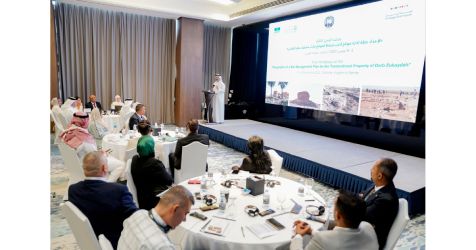Contact Center
.
06 November 2023
Preparations Continue to Register Pilgrimage Routes “Darb Zubaydah” On Tentative List as Transnational Serial Property, The Arab Regional Center for World Heritage Schedules a workshop attended by 30 experts from Saudi Arabia and Iraq


The very challenging 3rd workshop on ‘The Preparation of a Site Management Plan for the a Joint Transnational Serial Property of Darb Zubaydah’ Pilgrimage Routes kicked off on Sunday, 5 November, 2023, in the presence of His Excellency Sheikh Khalifa bin Ahmed bin Abdullah Al Khalifa, Chairman of the Board of Directors of the Arab Regional Center for World Heritage. Indeed, this workshop will carry on until November 9th, with the participation of 30 experts from the Kingdom of Saudi Arabia and the Republic of Iraq. The “Pilgrimage Routes: Darb Zubaida” site is the first Transnational site in the Arab world to be nominated for inclusion on the UNESCO World Heritage List, currently on the Tentative List sites nominated by both Saudi Arabia and Iraq.
Speaking for the occasion, His Excellency Shakh Khalifa bin Ahmed bin Abdullah Al Khalifa said that this workshop is part of Arab Regional Center’s ongoing efforts to enhance the representation of Arab countries on the UNESCO World Heritage List. H.E rejoined to add that the Hajj Pilgrimage Routes: The Darb Zubaydah (Saudi)) is the first Arab site, part of the Tentative list of Saudi Arabia in order to qualify for inclusion in the World Heritage List, which will be an excellent opportunity to promote the region’s historical heritage. It has a long cultural heritage, in addition to its contribution to advancing sustainable development efforts for local communities on a very large scale, H.E added. Moreover, the Darb Zubaydah is a Hajj Pilgrimage Route that links the Iraqi city of Kufa to Makkah. This is a serial nomination of 9 sites; it includes fortresses, wells, and a cleared road. The Iraqi part of this route is also on the Tentative List.
In addition, the workshop will shed light on aspects of managing World Heritage sites according to international standards, preserving their authenticity and sustainability. It is part of the Capacity Building Progam on ‘The Preparation of a Site Management Plan for the Transnational Serial Property of Darb Zubaydah’. Moreover, the workshop is organized in collaboration with the Heritage Commission under the Ministry of Culture in the Kingdom of Saudi Arabia, and in cooperation with the State Board of Antiquities and Heritage in the Republic of Iraq.
Moreover, the program is conducted following a technical support request from Saudi Arabia. It focuses on developing national management plans, legal protection mechanisms, buffer zone borders, and sustainable development goal. It aims to integrate these aspects into protection and management processes for World Heritage Sites.
Worth to mention that UNESCO Convention’s definition of Transnational Serial Property reads as follow: As serial properties will include two or more component parts related by clearly defined links: a) Component parts should reflect cultural, social or functional links over time that provide, where relevant, landscape, ecological, evolutionary or habitat connectivity. Each component part should contribute to the Outstanding Universal Value of the property as a whole in a substantial, scientific, readily defined and discernible way, and may include, inter alia, intangible attributes. The resulting Outstanding Universal Value should be easily understood and communicated. Consistently, and in order to avoid an excessive fragmentation of component parts, the process of nomination of the property, including the selection of the component parts, should take fully into account the overall manageability and coherence of the property. The Operational Guidelines of the 1972 World Heritage Convention, thus, encourages that these files be submitted jointly.







